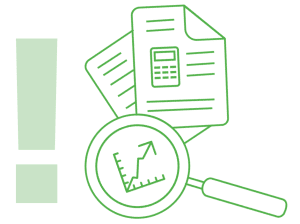What to do when the tax office makes a mistake? How do the regulations regulate the duration of a tax inspection and is a representative really necessary in the inspection activities? Michał SZCZECH, Junior Tax Supervisor at RSM Poland, in an interview with "Dziennik Gazeta Prawna" raised the topic of how taxpayers should deal with tax authorities that do not exercise due diligence when initiating proceedings.
Most of us, hearing the word "treasury office", immediately think: "treasury control". And we immediately feel uncertainty, we wonder if everything is fine, whether the tax proceedings will show anything. Is this a valid fear?
No. Certainly, many people are afraid of the treasury and feel uncomfortable at the thought of control, but completely falsely. This is something that results from the law and something that happens in economic transactions. Just as we have our tax obligations, the tax authorities have theirs that they must fulfill. And that means that these checks are nothing scary or unusual.
Well, let's tell everyone how such a "textbook" control from the tax office should look like.
This is a very broad topic. However, to shorten it very much: let's treat contact with the tax office like any other normal activity related to running a business, but let's not forget about extreme caution and accuracy.
In the case of a tax audit, it is worth paying attention to the key elements for its course. First of all - the moment of initiation of the inspection. It sets many deadlines that translate into the entrepreneur's ability to operate. The inspection is initiated not earlier than 7 days and not later than 30 days after the notification of the inspection has been delivered. It is initiated by presenting the identity card and the inspection authorization.
This means that the taxpayer first receives a notification about the initiation of the inspection - i.e. written information that someone will come to the company. Only then can an official appear on the spot, who shows his ID card and a document authorizing him to carry out this inspection. And it is at this point that the inspection is officially initiated.
Why should you remember this? For a simple reason: as taxpayers, in the period between receiving information about the audit and its initiation, we have time in which we can prepare. We can check that we have all contracts from the period under review, find all relevant documents, make sure all invoices are paid and review them for risk. We also have time to amend our tax returns if in doubt.
Does this mean that the taxpayer receives information on the scope of the tax audit and what documents may be required before the proceedings are initiated?
Not really… When we receive a notification about an inspection, we get general information about the inspection, the period and the tax that will be inspected. The direction in which the inspection will go will depend on the subsequent actions taken by the tax office inspectors.
Learn more about resolving disputes with tax authorities
Thus, we already have the basic information: we know the period that the officials will check, we know what tax it is about and we make the most of our time to prepare for the inspection. The day comes when a person authorized to inspect comes. What's next?
We must have a designated place to conduct the inspection - most often it is the registered office of the controlled taxpayer, but tax office inspectors can also go to another place where documents and tax books are kept. As taxpayers, we can even deliver documents to the tax inspector's office - if we agree to it.
At this point, we should think about our rights and obligations. It is worth noting that the control must be limited in time. In the documents we receive, we have the duration of the tax audit and the deadline for its completion. If it is not completed within this period, the tax authority must inform us about it, indicate a new date for completing the procedures and provide information why the originally planned duration of the inspection was not maintained.
If there are delays and officials fail to meet the above obligations, we have the right to submit a reminder to a higher level authority. If the deadline is not met again, we have the option of filing a complaint with the administrative court.
What are the other obligations and rights of the controlled taxpayer?
A very special right of the controlled entity is the possibility of submitting an objection resulting from the Act on Entrepreneurs' Rights. An objection may be lodged if the inspection is carried out despite the fact that we have not received the notification about the initiation of the inspection, there were errors in the notification, or the representative of the office did not show the identity card when starting the activity. The controlling party is obliged to consider such an objection within 3 days and indicate whether it is justified or not. If he fails to do so within this period, it is considered that the objection was justified and the control and verification of the books is suspended.
And what rights and obligations must the controlling party adhere to?
The rights and duties of civil servants are very broad, but it is worth noting that they are also limited. Example? The scope of the tax audit can never go beyond the scope indicated in the authorization. However, the tax office can circumvent this in some way: it happens quite often that - if the result of the inspection is unsatisfactory, because officials find some irregularities, the source of which was not covered by the scope of the inspection - the authorities decide to initiate another inspection, on a different date (or tax) to compare whether this irregularity also occurred in other years.
That is why it is so important to monitor the documents we send to the tax authorities.
How should entrepreneurs behave during the inspection?
The controlled taxpayer has his rights and obligations and should stick to them, i.e. do what the regulations require him to do and - for his own good - nothing more. Because "more" does not always mean "better".
What does this mean in practice? During the tax inspection activities, we should provide only what we are asked for and only what results from the authorization, so as not to unnecessarily raise a topic that the inspection does not concern and not to show a lack of knowledge in a certain field or - worse - not report on yourself. It's about not being holier-than-thou.
Polish tax law is extremely complex and everyone has the right to make some mistakes, but this does not mean that we have to give them to officials on a platter. Therefore, it is worth checking whether the notification of the tax inspection is correctly formulated, whether the documents required from us are related to the scope of the inspection and result from the authorization, and whether the inspectors do not go too far when examining tax books.
Let's emphasize this: we have no obligation to provide the authorities with what they have no right to investigate.
And is it worth discussing the documents with the inspectors already at the inspection stage and clarifying their doubts, or is it better to wait for the inspection results and the final report?
There is no one right answer here. I am of the opinion that it is worth dispelling doubts and presenting your arguments at the initial stage, when the inspection is just beginning to be carried out. An official is also a human being and - not always, but quite often - it happens that he can understand logical explanations, accept that the situation has become complicated and understand why we fulfilled our tax obligations in this way and not otherwise.
Let's assume that everything has been done properly: we received a notification about a tax inspection, the inspectors met the deadline, reviewed the documents they were supposed to review, the entrepreneur submitted explanations that he considered important - what next?
Next, we receive a tax inspection report from the tax office. The inspected party may, within 14 days of its delivery, submit reservations or explanations. On this occasion, he may indicate his evidentiary conclusions (if they have not been presented before), or recall the previously submitted ones and present them again to emphasize the importance of his position.
When we receive the tax inspection report, it is worth re-analyzing the procedure for initiating the inspection, make sure that the inspection was conducted in accordance with the regulations and did not go beyond the specified scope, check the documents we provided to the tax office and the summons that we got from officials. It is important to look at the whole process holistically. Check what we have provided to the authority, which of these documents and information have not been mentioned in the inspection report, make sure that the inspector has included our explanations and all documents that in our opinion are the most important in the case and present his position again.
And if the inspection is completed and we do not agree with its result, can we appeal? Or rather, we are facing a mandatory correction of the tax declaration?
If any irregularities were indicated in the inspection report, the tax office informs us what we should do - e.g. just prepare a correction of the tax return. If we do not meet the requirements of the Polish Tax Office within 6 months, the tax authority has the right to initiate tax proceedings in this regard.
However, if we believe that everything is done correctly, our arguments have not been taken into account, then instead of submitting a correction, we can appeal against the inspection report and submit explanations or reservations.
We already know that control without notification is against Polish regulations. We also know that we have a few days to prepare when we receive a notification about the initiation of an inspection. How to use this time?
As I have already mentioned, before the actual inspection begins, the entrepreneur receives a notification and has time to prepare for it. This time is extremely important - then it is worth reviewing the documents, checking whether all invoices are paid, verifying the books and checking whether we have all documented costs, so that - if we have any doubts - we should immediately submit a correction in this regard.
For companies and people who already have experience in dealing with the Polish tax office, preparation for the inspection will also include appointing an inspection coordinator – it can be a person inside the company, but it can also be, for example, a tax advisor.
The task of such a person is to monitor correspondence with the authority and ensure that the taxpayer provides only the information that is relevant and results from the request - that is, that which is within the scope of the inspection authorization. The coordinator also controls how much time is left to answer the tax authorities, delegates the tasks necessary to perform them, and is also the best informed person in the matter.
What about communication with the office? How to run it so that the control goes smoothly?
The control is highly formalized and as long as we operate within the legal framework, within the regulations, we can be sure that our rights will be respected. One of the rights that is worth paying attention to - I will come back to it, because it is crucial - to answer only what we have been asked to do. And for this to happen, all communication must be in writing.
Pay attention to whether the letters sent by the tax office meet the requirements of the Act - whether the authorization has all the formal conditions, whether everything is listed in it, including instructions, whether the summons, apart from providing substantive information (i.e. the scope of control), also meets all formal conditions , i.e. whether it is signed, whether it is with the correct header, addressee, etc.
Checking these things is important because it happens - especially in transformed companies - that the authorization for inspection is issued to the wrong entity, there is an error in the name or legal form. Therefore, this authorization is invalid. And it's the same with any other document we receive from the authority!
Let's not respond to something that does not meet the formal conditions. And let's remember that what we say (and write) to the Polish authority must also be documented - for our safety, so that we know that the Tax Office, when checking all documents and making decisions, has our statements and evaluates all the evidence.
Let's remember: disputes with tax offices are normal - and they will happen, because Polish regulations are of different quality, they are also interpreted differently. Therefore, it is worth and even necessary to keep to the formalities. As taxpayers, we should not only fulfill our obligations, but also remember about our rights.





